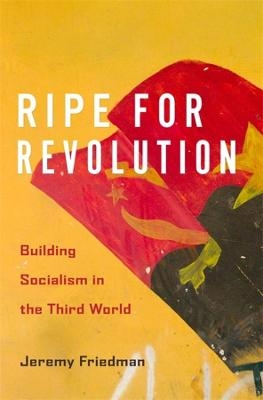
Ripe for Revolution
Building Socialism in the Third World
Seiten
2022
Harvard University Press (Verlag)
978-0-674-24431-3 (ISBN)
Harvard University Press (Verlag)
978-0-674-24431-3 (ISBN)
The Cold War–era experiments of the Global South make clear that socialism is more than Stalinism. Jeremy Friedman looks to Indonesia, Chile, Tanzania, Angola, and Iran to understand how socialism has worked in practice. Each state developed its own socialism, pragmatically addressing local needs and shaping the horizons of socialism today.
A historical account of ideology in the Global South as the postwar laboratory of socialism, its legacy following the Cold War, and the continuing influence of socialist ideas worldwide.
In the first decades after World War II, many newly independent Asian and African countries and established Latin American states pursued a socialist development model. Jeremy Friedman traces the socialist experiment over forty years through the experience of five countries: Indonesia, Chile, Tanzania, Angola, and Iran.
These states sought paths to socialism without formal adherence to the Soviet bloc or the programs that Soviets, East Germans, Cubans, Chinese, and other outsiders tried to promote. Instead, they attempted to forge new models of socialist development through their own trial and error, together with the help of existing socialist countries, demonstrating the flexibility and adaptability of socialism. All five countries would become Cold War battlegrounds and regional models, as new policies in one shaped evolving conceptions of development in another. Lessons from the collapse of democracy in Indonesia were later applied in Chile, just as the challenge of political Islam in Indonesia informed the policies of the left in Iran. Efforts to build agrarian economies in West Africa influenced Tanzania’s approach to socialism, which in turn influenced the trajectory of the Angolan model.
Ripe for Revolution shows socialism as more adaptable and pragmatic than often supposed. When we view it through the prism of a Stalinist orthodoxy, we miss its real effects and legacies, both good and bad. To understand how socialism succeeds and fails, and to grasp its evolution and potential horizons, we must do more than read manifestos. We must attend to history.
A historical account of ideology in the Global South as the postwar laboratory of socialism, its legacy following the Cold War, and the continuing influence of socialist ideas worldwide.
In the first decades after World War II, many newly independent Asian and African countries and established Latin American states pursued a socialist development model. Jeremy Friedman traces the socialist experiment over forty years through the experience of five countries: Indonesia, Chile, Tanzania, Angola, and Iran.
These states sought paths to socialism without formal adherence to the Soviet bloc or the programs that Soviets, East Germans, Cubans, Chinese, and other outsiders tried to promote. Instead, they attempted to forge new models of socialist development through their own trial and error, together with the help of existing socialist countries, demonstrating the flexibility and adaptability of socialism. All five countries would become Cold War battlegrounds and regional models, as new policies in one shaped evolving conceptions of development in another. Lessons from the collapse of democracy in Indonesia were later applied in Chile, just as the challenge of political Islam in Indonesia informed the policies of the left in Iran. Efforts to build agrarian economies in West Africa influenced Tanzania’s approach to socialism, which in turn influenced the trajectory of the Angolan model.
Ripe for Revolution shows socialism as more adaptable and pragmatic than often supposed. When we view it through the prism of a Stalinist orthodoxy, we miss its real effects and legacies, both good and bad. To understand how socialism succeeds and fails, and to grasp its evolution and potential horizons, we must do more than read manifestos. We must attend to history.
Jeremy Friedman is Associate Professor of Business Administration at Harvard Business School. The former Associate Director of the Brady-Johnson Program in Grand Strategy at Yale University, he is the author of Shadow Cold War: The Sino-Soviet Competition for the Third World.
| Erscheinungsdatum | 31.01.2022 |
|---|---|
| Zusatzinfo | 5 Maps |
| Verlagsort | Cambridge, Mass |
| Sprache | englisch |
| Maße | 156 x 235 mm |
| Themenwelt | Geisteswissenschaften ► Geschichte ► Allgemeine Geschichte |
| Sozialwissenschaften ► Politik / Verwaltung ► Politische Systeme | |
| Sozialwissenschaften ► Politik / Verwaltung ► Politische Theorie | |
| Sozialwissenschaften ► Soziologie ► Spezielle Soziologien | |
| ISBN-10 | 0-674-24431-1 / 0674244311 |
| ISBN-13 | 978-0-674-24431-3 / 9780674244313 |
| Zustand | Neuware |
| Haben Sie eine Frage zum Produkt? |
Mehr entdecken
aus dem Bereich
aus dem Bereich
eine Familiengeschichte der Menschheit
Buch | Hardcover (2023)
Klett-Cotta (Verlag)
49,00 €
Eine wahre Geschichte von Schiffbruch, Mord und Meuterei
Buch | Hardcover (2024)
C.Bertelsmann (Verlag)
25,00 €


